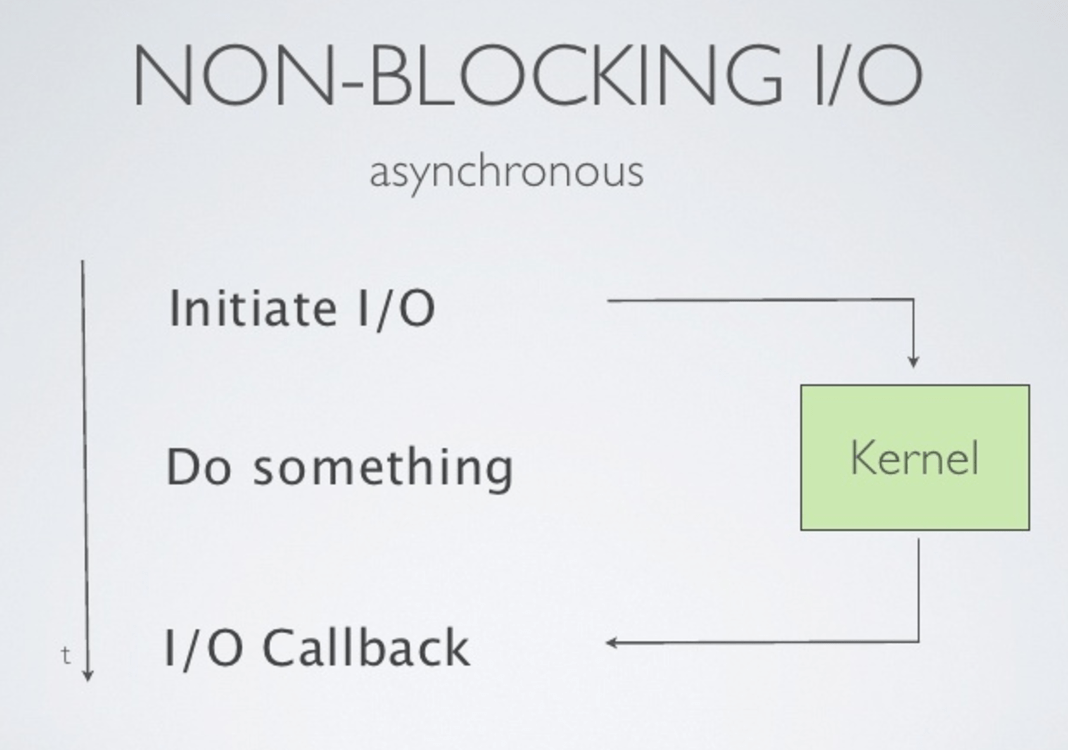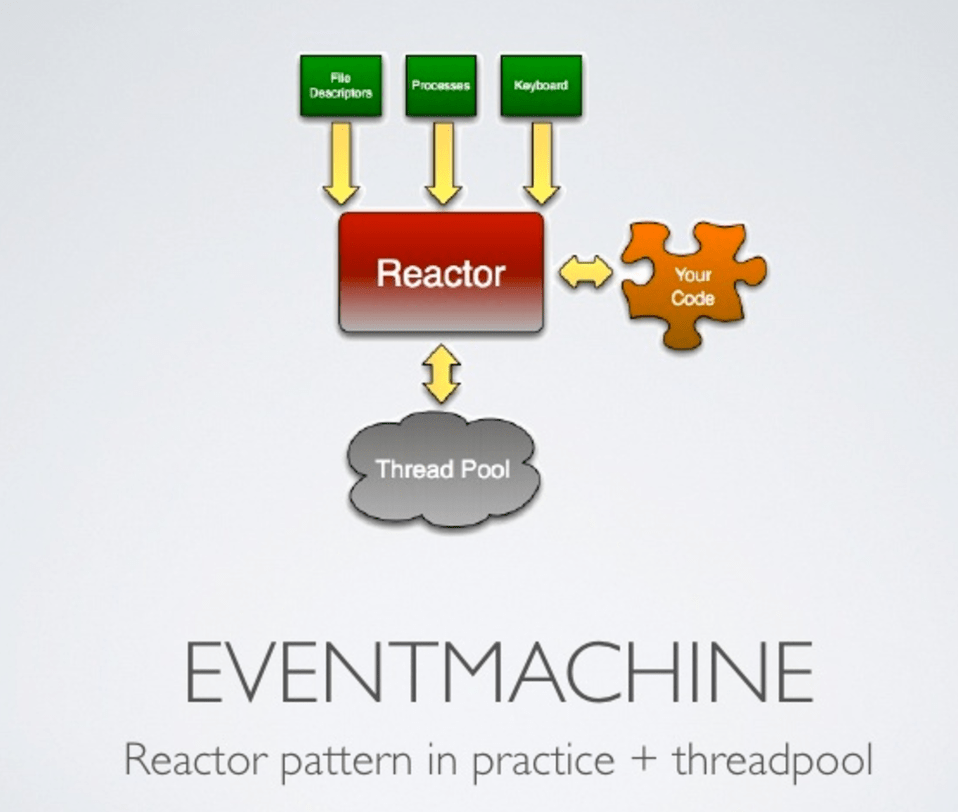Plumbing Event Machine
Reference
- Advanced Eventmachine by Jonathan Weiss
- Defeating blocking I/O with eventmachine
- EventMachine internals and the Reactor pattern
Basic
- Process multiple I/O “at once” without the need for threads.
- Register callbacks to respond to events

This is the event loop:
EM.run do
…
…
EM.stop
end
What happened in the event loop?

EM run timers, check FDs and networking stuff, then run the callbacks you registered. So, there should no synchronous call in the event loop. (Note, even if you are reading a lot of messages on the sockets can somehow slow down the event loop)
Advanced
EM.next_tick
It runs the block you passed in the next iteration of the event loop. If you are doing a bunch of operations, you can use it to reschedule your work. It can bring you back from a background thread. It’s also useful to move I/O from deferred thread to main thread.
work = proc do
do_something()
EM.next_tick &work
end
EM.next_tick &work
EM.defer
It runs the block you passed in a background thread. If you have long running computations / processes, if you do something that’s potentially blocking the main loop, wrap it in a EM.defer. If you are doing I/O, it should be rescheduled to the main loop using EM.next_tick.
EM.defer is used to push a otherwise blocking operation on an EM internal queue whose jobs are then processed by a thread pool of 20 threads (by default). You can use EM.defer with operations which aren’t made to work asynchronously. EM.defer is one of EventMachine’s mechanisms for lightweight concurrency. EM.defer makes it easy and graceful to initiate a long-running (“deferrable”) operation (such as a call to an external web site), and attach any number of code blocks to be executed when the deferrable operation completes.
“I/O in the main reactor thread, and anything that’s potentially slow in the deferred thread. If you are not sure, wrap it in a EM.next_tick or a EM.defer block”.

Demo 1: Running operations in deferred threads and callbacks in the main loop, which means IO can block deferred threads.
require "eventmachine"
operation = proc {
puts "defer: #{Thread.current}"
# perform a long-running operation here, such as a database query.
"result"
}
callback = proc { |_| puts "callback: #{Thread.current}" }
errback = proc {}
EM.run do
puts "main: #{Thread.current}"
EM.defer(operation, callback, errback)
puts "running..."
end
main: #<Thread:0x007fa2a207f390>
running...
defer: #<Thread:0x007fa2a404fb98>
callback: #<Thread:0x007fa2a207f390>
Demo 2: Use event based gem to enable the deferred threads to register a callback for a HTTP request, which leverages the power of event loop.
require "eventmachine"
require "em-http-request"
require "httparty"
blocking_operation = proc {
puts "defer: #{Thread.current}"
time = Time.now.to_f
10.times { HTTParty.get("https://google.com").response } # blocking IO
puts "finish operation: #{Time.now.to_f - time} s"
}
non_blocking_operation = proc {
puts "defer: #{Thread.current}"
time = Time.now.to_f
10.times { EM::HttpRequest.new("https://google.com").get } # non-blocking IO
puts "finish operation: #{Time.now.to_f - time} s"
}
callback = proc do |_|
puts "callback: #{Thread.current}"
EM.stop
end
errback = proc {}
EM.run do
puts "main: #{Thread.current}"
EM.defer(blocking_operation, callback, errback)
# main: #<Thread:0x007fd68c87f3b0>
# running...
# defer: #<Thread:0x007fd68cdf0c90>
# finish operation: 3.247986078262329 s
# callback: #<Thread:0x007fd68c87f3b0>
# EM.defer(non_blocking_operation, callback, errback)
# main: #<Thread:0x007fb18707f3b0>
# running...
# defer: #<Thread:0x007fb189a1ed88>
# finish operation: 0.013278961181640625 s
# callback: #<Thread:0x007fb18707f3b0>
puts "running..."
end
Deferrables
Basically, it’s a state machine with callbacks for building evented libraries. Status: nil, succeed, failed. You can register the callback at anytime.
- callback, executed when transitioned to :succeed or already :succeed
- errback, executed when transitioned to :failed or already :failed
Allows for EventMachine style concurrency in your code.
EM::Queue
A cross thread, reactor scheduled, linear queue.
EM::Channel
Provides a simple thread-safe way to transfer data between (typically) long running tasks in defer and event loop thread.
EM::Iterator
A simple iterator for concurrent asynchronous work.
- Process the given items in parallel
- Callback when all are ready
- You need to manually signal the iteration end
For example, to fetch 10 urls at a time, simply pass in a concurrency of 10:
responses = urls.map{ |url| sync_http_get(url) } ... puts 'all done!’
EM::Iterator.new(urls, 10).map(
proc{ |url,iter| async_http_get(url){ |res| iter.return(res) } },
proc{ |responses| ... puts 'all done!’ }
)
EM::Schedule
Runs the given callback on the reactor thread, or immediately if called from the reactor thread. Accepts the same arguments as Callback
Fibers & EM-Synchrony
Write synchronous code with asynchronous underneath.
Promise.rb
Promise.rb is a thin wrapper on Em.defer. It helps us avoid passing callbacks all the time, instead features us thenable (chainable) operations. Better handle I/O in the main loop and everything potentially slow in the deferred threads.
~~If blocking I/O happens in deferred thread, we can use Em.next_tick to transfer the control to the main thread. That’s the reason why to use Promise.rb, at least we have to define a defer method yielding operations in Em.next_tick. ~~
No, the EM.next_tick method Promise.rb uses is called to transfer the control to main loop to run the callback.
Promise#then has an interesting method signature, which enables
Promise.new( proc {}, proc {} )Promise.new { }- the
rescueorcatch
class Promise
def then(on_fulfill = nil, on_reject = nil, &block)
on_fulfill ||= block
...
end
def rescue(&block)
self.then(nil, block)
end
alias_method :catch, :rescue
With Promise enabled, we could write code like
EM.defer(operation, callback, errback);
EM.promise_defer(&operation).then(&callback).catch(&errback)
Concerns
- Exception handling
- Test
Wrap up
- Do not block the event loop (Even though you are not using synchronous code, you still should not do anything that takes too long.)
- No blocking I/Os in the main loop. Put everything potentially slow to deferred threads
- Handle all I/O in the main loop
- Avoid non-evented libraries
- Callback runs until finished. (So split workload over multiple iterations if needed:
EM.next_tick) - Use
EM.next_tickandEM.deferto make sure you are in the right context - Use Deferrables and Fibers to make the code nicer
Here, I got confused when I reviewed the notes here. We say “handle I/O in the main loop”, but why no blocking I/Os in the main loop. Isn’t it possible that you put a DB query in the main loop and EM will run it asynchronously and automatically? NO! EM features select underneath only means that it will help you detect the IO changes and run your callbacks asynchronously and automatically. So, you have to register your blocking operation (DB query) with a callback to transform it into a non-blocking operation.
In some way, event based program is all about registering callbacks. Keep a loop running without blocking operations. We can transform synchronous code into event with callbacks, thus to enable asynchronism. To schedule the callbacks, one is to use EM.next_tick to make it ran later in the main loop and the other is to use EM.defer to make it ran in threads. When I/O happens in a deferred thread, we can use EM.next_tick to kick the control back to the mail loop.